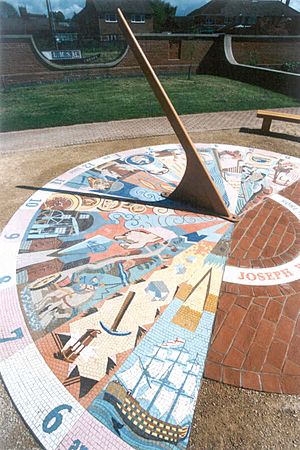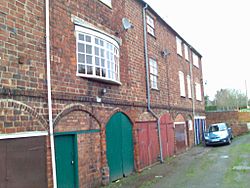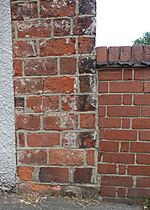Joseph Wilkes facts for kids
Quick facts for kids
Joseph Wilkes
|
|
|---|---|
| Spouse(s) | Elizabeth Wood |
| Parent(s) | Joseph Wilkes (farmer) |
Joseph Wilkes (born 1733, died 1805) was a super smart English businessman and farmer from the 1700s. He was born in Overseal, Derbyshire, but he's mostly known for his work in Measham, Leicestershire. Joseph came from a farming family, but he became a very important leader during the early days of the Industrial Revolution in England.
Contents
Joseph Wilkes: A Business Leader
Joseph Wilkes was involved in many different businesses. He completely changed the small mining village of Measham into a modern town during the Industrial Revolution. In 1777, he bought the land and buildings of the manor with his brothers.
After that, he started building and expanding the village. He opened a bank, an inn, and built factories. He also created a boat yard, a market house, and a church building. Plus, he built affordable homes for his workers. Many of these buildings and changes can still be seen in Measham today!
To remember Joseph Wilkes, a special mosaic sundial was built near Wilkes Avenue in Measham. It was made by the artist Steve Field and shows many of the businesses Wilkes started.
Mining for Coal
One big part of Joseph Wilkes's work was mining hard-crude-coal. Coal was super important back then because it powered the factories and machines of the Industrial Revolution. In 1767, Wilkes got the right to mine coal in the Measham area. Later, he owned coal mines in Measham, Oakthorpe, Donisthorpe, Moira, and Brinsley in Nottinghamshire.
Wilkes dug many new mines. He used Newcomen steam engines to pump water out of the mines. This allowed miners to dig much deeper for coal. He also used steam-powered machines at his Oakthorpe mine to lift men and coal more easily. To move the heavy coal from his mines to the canals, Wilkes built horse-drawn iron tracks. This made moving large amounts of coal over land much cheaper and faster.
Making Textiles
Joseph Wilkes also worked in the textile industry, which makes cloth and fabric. He teamed up with Sir Robert Peel to build cotton mills in Tamworth and Fazeley. In 1774, he rented and improved a mill that bleached cloth on the River Mease.
He also built huge cotton and carding mills in Measham and Ashby de la Zouch. These mills used water wheels and the newest Boulton and Watt steam engines to power their machines. Wilkes also helped local people start small businesses at home. He built many weaving shops in Measham and Appleby Magna.
Improving Transport
Wilkes wanted to make it easier to move goods and people around. He helped build a coaching inn (a place for travelers to stop) and turnpike roads in and around Measham. These were special roads where you paid a fee to use them. He designed his roads with a "concave surface," which meant they were stronger and easier to fix.
He also worked on other ways to transport goods. Moving things by water was the cheapest way to ship large amounts of goods back then. Wilkes was part of a group called the "Burton Boat Company." In 1762, they got the right to make the River Trent easy for barges to use.
Later in his life, he helped start and manage the Ashby-de-la-Zouch Canal. Wilkes knew how much the canal would help the local economy. He encouraged landowners like the Earl of Moira to finish it quickly. He even supplied bricks for its construction. The canal was supposed to connect to the Coventry Canal and the River Trent. It was finished in 1804, but it cost more than planned and didn't work out as well as everyone hoped.
Wilkes also saw the early potential of railways, which would eventually become even more important than canals. Before steam locomotives, horse-drawn carts on iron rails were the best way to move heavy loads over land. Wilkes wrote about how useful these "iron rail-ways" were in 1800. He worked with Benjamin Outram to build iron tracks connecting his coal mines to the canals.
Making Bricks
Many of the buildings in Wilkes's business empire were made with bricks from his own brickyard in Measham. He was famous for his special Jumb or Gob bricks. These bricks were double the usual size! He made them between 1784 and 1803. The idea was to pay less brick tax, which was charged for every thousand bricks used. You can still see some buildings in Measham and nearby areas today that have Wilkes's unique recessed arches and oversized bricks.
Farming and Agriculture
Wilkes was very interested in new ways to farm and improve land. The writer Arthur Young called him "a breeder, and a farmer on no slight scale." Another writer, John Farey, said in 1815, "If every area in Britain had its Joseph Wilkes, we wouldn't need to buy corn from other countries!"
Wilkes wanted to make his farmland more productive. He wasn't afraid to try new methods. He experimented with different ways to make his soil better, like deep ploughing and burning the soil. He even tried fertilizing his land by pumping water from his mines onto it. Wilkes also built a series of irrigation canals around Measham to water the crops. He strongly believed in using new farming machines, like Cooke's Horse-hoe.
In animal farming, Wilkes tried new ways to keep animals underground and feed them from hoppers above. He was also interested in the new science of selective breeding, which means choosing the best animals to breed to get stronger, healthier offspring. He was a member of the Leicestershire tup society, helped start the Smithfield Club, and bred one of Robert Bakewell's famous rams.
Joseph Wilkes's Family Life
Joseph Wilkes was born in 1733 into a large family that was quite well-off. His father, also named Joseph Wilkes, was a farmer and owned a farm in Overseal.
In 1759, Joseph Wilkes married Elizabeth Wood from Burton upon Trent. Sadly, his married life was short because Elizabeth died in 1767. His only son did not live past infancy. However, some of his daughters grew up and got married. Joyce and Matilda married brothers, Rev. Thomas Fisher and Rev. John Fisher. John Fisher was the lord of the manor and rector of Higham on the Hill. Matilda and John Fisher were the great-grandparents of Geoffrey Fisher, who became the Archbishop of Canterbury from 1945 to 1961. Joseph Wilkes passed away in Croydon in 1805 and is buried there.
 | Jackie Robinson |
 | Jack Johnson |
 | Althea Gibson |
 | Arthur Ashe |
 | Muhammad Ali |




